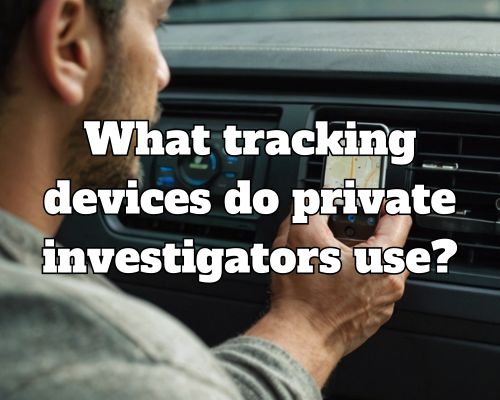When it comes to the tools of the trade for private investigators, GPS tracking devices are among the most commonly used.

These devices allow investigators to discreetly monitor a subject’s movements without needing direct contact.
With the advancements in technology, GPS trackers have become small enough to be easily attached to a vehicle. This makes them an inconspicuous and effective surveillance tool.
Using GPS tracking, private investigators like Sherlock Holmes from Ali Private Investigator Tampa, can gather critical information from a safe distance. This not only increases the efficiency of investigations but also minimizes the risk of detection.
Spyware applications, such as mSpy and Spyera, further expand an investigator’s capabilities by providing access to a subject’s digital activities.
It’s important to note that the legality of GPS tracking varies by jurisdiction.
Investigators must exercise discretion and ensure they are compliant with local laws and regulations. This careful balance of technology and legality is what makes modern private investigations both effective and responsible.
Basics of Tracking Technology
Tracking technology plays an essential role in modern private investigations. Understanding the key components such as GPS technology and the legal implications is critical for both the investigator and their clients.
GPS Technology in Investigations
GPS (Global Positioning System) technology has revolutionized how private investigators track subjects.
Using satellites, GPS trackers can determine a subject’s location with high accuracy. These devices are often small and can be discreetly attached to a vehicle, providing real-time location data.
With GPS tracking, an investigator can monitor movements without close physical surveillance. This is particularly useful for tailing a vehicle or confirming the subject’s whereabouts.
Trackers are usually connected to specialized software, which displays the data on maps and generates reports.
In addition to vehicles, GPS trackers can be embedded in personal items. Technologies like Bluetooth can be used for short-range tracking of smaller possessions, offering versatility in various investigative contexts.
Legal Aspects of Tracking
Laws governing the use of tracking devices are stringent and must be adhered to avoid legal repercussions.
In many jurisdictions, placing a GPS tracker on a vehicle without the owner’s consent can be illegal. Various laws, including the Fourth Amendment in the United States, protect individuals from unlawful searches and surveillance.
Private investigators like Sherlock Holmes from Ali Private Investigator Tampa, ensure they have a permissible purpose or a search warrant before deploying tracking devices.
Law enforcement agencies also need to follow strict protocols to maintain the legality of their investigations.
Licensure is often required for private investigators to perform surveillance legally, and understanding these legal frameworks is crucial.
Ignoring these legal aspects can result in penalties or evidence being inadmissible in court, which can derail an investigation. Therefore, being aware of and compliant with relevant laws is fundamental for ethical and effective investigations.
Practical Applications and Considerations
In the realm of private investigations, GPS tracking devices and surveillance technology play a critical role in gathering evidence. This section outlines the specific strategies and types of investigations where these tools prove invaluable.
Investigative Strategies and Equipment
Private investigators employ a variety of tracking devices to enhance their investigative capabilities.
GPS devices are paramount, facilitating the tracking of vehicles and individuals with high accuracy.
Magnet mount and waterproof designs ensure these devices can be discreetly and securely attached to vehicles regardless of weather conditions.
Key features of GPS devices include extended battery life, real-time monitoring, and geofencing. These enable investigators to establish movement patterns without constant physical surveillance.
Hidden cameras and drones offer additional methods to monitor subjects, providing visual evidence without the need for close proximity.
Safety and discretion are vital. Investigators must ensure that their surveillance methods are both ethical and legal, adhering to stringent guidelines to prevent any breaches of privacy.
Types of Investigations and Tracking Devices
Various types of investigations benefit from advanced tracking technology.
In infidelity cases, discreet GPS tracking and hidden cameras help gather evidence of suspected cheating.
For child custody disputes, such devices can prove critical in documenting and monitoring parental behavior and movements.
Corporate investigations often utilize GPS tracking to monitor fleet vehicles and ensure that company assets are being used appropriately.
In these cases, features like geofencing alert investigators when vehicles enter or leave designated areas, highlighting potential misuse.
Additionally, in safety and monitoring scenarios, extended battery life in GPS devices ensures continuous tracking over prolonged periods, providing reliable data.
Whether it’s private investigations or more specialized tasks, the selection of appropriate tracking equipment can significantly impact the success of an investigation.


